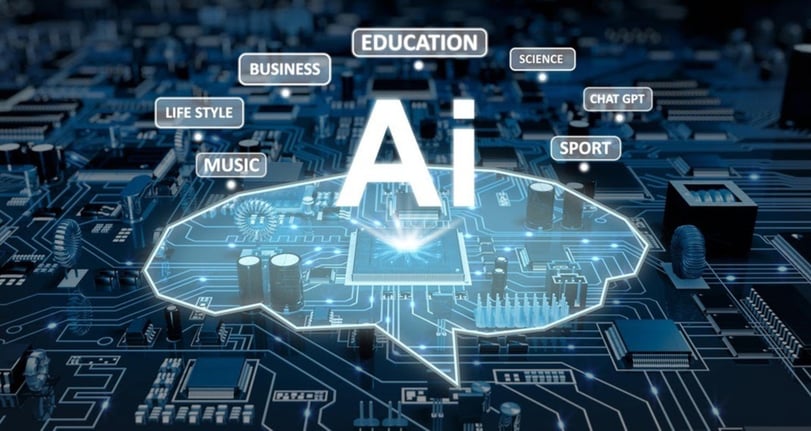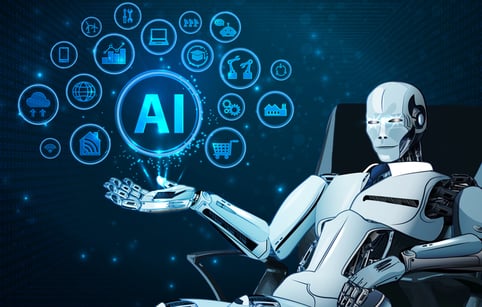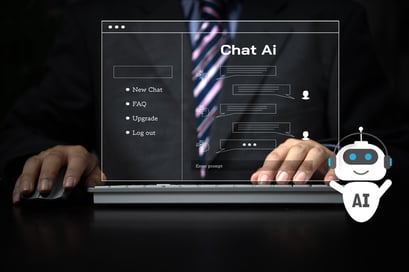Inbound Marketing Blog
for Manufacturers and Healthcare Companies
AI in Digital Marketing: What Changes Are Ahead in 2024?

From the first computer to today’s smartphones, Internet access has made leaps and bounds in terms of both efficiency and reach. Likewise, the question of how AI will change marketing is central to the evolving landscape of how we interact with current and potential buyers.
Generative AI is the next new thing. Defined as “deep-learning models” that are given data to study and use it as a foundation to create high-quality content, from text to images. These models can learn to provide software codes, tables and organized data from a raw report, and work with other data as well.
With the capabilities and strong interest, now is the time to tune in and consider what changes will occur in the marketing industry as a result of the incorporation of generative AI.
The State of AI in Digital Marketing: Where the Big Guys Stand
There’s no shortage of competition within the generative AI (GenAI) industry.
The big names are at various points in their commitment to AI. OpenAI set the ball rolling with ChatGPT, which generates information based on the prompts it’s given. ChatGPT allows you to store threads that could focus on a specific topic, task, or other singular point, “learning” and refining the results users get with each additional influx of information.
Google’s Gemini, meanwhile, has three separate iterations:
- Gemini Ultra: Used for complex tasks. This version is the competition for ChatGPT 4.0 and can reportedly handle not only words and images but nuance, coding and complex topics in the mathematics field. It also can respond to questions in real time.
- Gemini Pro: Used for a wide range of tasks. This version can be compared to ChatGPT 3.5, capable of helping with not only summarization but also brainstorming and creating content.
- Gemini Nano: Used for on-device tasks. This model is considered reliable but lightweight and can handle summarizing web pages and creating images based on prompts.
Gemini is also a major source of visual creation – keeping the question of artistic appropriation top of mind for AI opposition. AI-generated images have already been put to use everywhere from marketing to meme culture.
In Q1 of 2024, Apple went from mum on the subject to fully committed, as it revealed plans to target its own corner of the market. Announcements of Apple’s answer to ChatGPT and Gemini were set for “later in the year.”
For those concerned about AI providing competitors with access to proprietary information, Claude 3 offers Haiku, Sonnet, and Opus. These platforms can analyze, forecast, generate code, and provide content generation in a short period – without providing outsiders access to your information. This is because Claude is more resistant to jailbreaks and provides high-level security for your data. It also claims to be HIPAA-compliant.
In the background, many other applications are in development to help B2B marketers with hyper-specific tasks. These tasks range from email generation, to social media posts, or even video generation (from scripts to AI voiceovers).
With websites like There’s an AI for That and Futurepedia, there are regularly new options added to the list for potential AI integration. These repository sites are updated with new applications as they become available.
4 Changes Spurred by AI in B2B Marketing
GenAI quickly became a resource that is valuable in several ways. With dependence on AI-driven analytics growing in almost every industry, it makes sense that marketers are recognizing the need for change in strategy and how they manage the buyer’s journey.
Predictions for 2024 and beyond are littering every tech and marketing publication, but we’ll throw our own extensive training and experience into the fray. With the proliferation of GenAI platforms, the question is HOW you should be incorporating it into your marketing strategy.
Here are the top four changes we expect to see as AI becomes more integrated into digital marketing:
- GenAI Adoption
- Reduced Organic Traffic
- AI-Free Brand Differentiation
- Reliance on Social Media
1. GenAI Adoption
By 2026, a substantial majority of creative professionals are expected to use GenAI daily, leading to an increase in Chief Marketing Officer spending on strategic creative endeavors. This trend signifies the growing importance of GenAI in producing creative-yet-personalized marketing content.
In a study published in February 2024, 72% of marketers surveyed admit to using AI, although a third of those say they are doing so without guidelines. Those uses range from research for headlines and keywords to brainstorming and writing new content.
These numbers are reinforced by Hubspot data, which notes that marketers are more productive and seeing notable ROI on AI use. Not only does it save the average marketing professional over 2 hours per day, but GenAI also provides significant potential for growth if adopted companywide.
Marketers already believe they have found a way to use AI to improve their content, free up time for creative endeavors (not to mention those tasks they enjoy), and improve the performance of content.
2. Reduced Organic Traffic
 The use of GenAI in search engines could reduce organic site traffic significantly, pushing brands to adapt their strategies to focus more on conversion-oriented content and possibly revitalize traditional channels like email marketing by 2028.
The use of GenAI in search engines could reduce organic site traffic significantly, pushing brands to adapt their strategies to focus more on conversion-oriented content and possibly revitalize traditional channels like email marketing by 2028.
As natural language processing gets better and new research tools come out, users will feel more comfortable trusting in the answers AI gives them. Plus, as the rise in voice-to-text searches has shown, a more conversational approach to research has proven popular.
With this in mind, you should adjust marketing strategies based on these search processes. SEO (search engine optimization) will still have its place, but adjusting strategy based on emerging search methods will improve a brand’s online presence and chance of success.
3. ‘AI-Free’ Brand Differentiation
Some brands will position themselves based on the absence of AI in their operations and products, appealing to consumers' desire for authenticity and ethical considerations. This strategy might emerge as a significant differentiator in the market by 2027.
Gartner’s annual marketing predictions report notes that by 2027, brands may take an “acoustic” approach to marketing, prioritizing their distance from AI and presenting that as a selling point. With this in mind, brands that use AI must be prepared to defend that decision with data and valid benefits for partners and consumers alike.
4. Reliance on Social Media
Buyer research, and even transactions, may happen directly on social media more often as AI streamlines a brand’s ability to provide personalized service. Hubspot, the world’s pre-eminent CRM platform, shared results from a study that showed 22% of millennials and 36% of Gen Z-ers relied on social media for information on brands in 2023. TikTok and Instagram are replacing Google Maps and Google Search for some users in these age groups.
This trend is partially because these generations rely more heavily on visual results for search queries – something Google Search does not prioritize. TikTok’s addition of a search bar at the bottom of each video highlighting related search terms gave TikTok a boost in user engagement – a feature that wouldn’t be available without the help of AI. Brands with young users on this platform need to be aware and shift their focus to remain relevant.
AI is already an active part of operating strategy for these social media platforms, providing them with valuable insights into their users and bolstering new features that make the platform more appealing to use.
How Is AI Changing Marketing? Insights from Hubspot
The changing ways in which both buyers and marketers use AI mean that strategists will have to adjust as well.
HubSpot always has its ear to the ground when it comes to new technology, so we put a lot of stock in their predictions. Their experts expect the following trends in marketing:
- Short-Form Video Content: Platforms like TikTok, Instagram Reels, and YouTube Shorts continue to dominate, with marketers leveraging these formats to engage audiences in new ways.
- Content Reflecting Brand Values: There's an increasing emphasis on creating content that aligns with a brand's values, which is crucial for retaining customers.
- Importance of Native Advertising/Sponsored Content: Despite changes in the marketing landscape, native advertising remains a valuable strategy for reaching new audiences.
- Continued Relevance of Influencer Marketing: Collaborations with influencers, particularly giveaways or working with ambassadors who regularly share hauls and codes for discounts, remain critical to marketing strategies.
- Leveraging AI in Marketing: AI's role in streamlining marketing processes and content creation continues to grow.
Understanding AI’s Impact on Digital Marketing
Today’s availability of GenAI is creating new opportunities for consumers who prefer a different approach to search and brand awareness. The trends and predictions noted here underscore the transformative impact of AI on marketing, driving both opportunities and challenges for brands.
Marketers must navigate these changes thoughtfully, balancing innovation with ethical considerations and consumer expectations.
In Digital Marketing, AI Brings Its Advantages
While AI’s initial appearance brought fears of job loss for marketers, the fears are largely unfounded. However, marketers who embrace AI as an opportunity to streamline tasks and better manage time will see their proactive approach bear fruit in terms of ROI and content performance.
For more insight into the advantages – and risks – AI can provide, consider making time for a webinar:
Our Blogs, Direct to Your Inbox!
How to Audit your Online Marketing
If you are executing digital marketing, congratulations! You are most likely already one step ahead of your competition, and making strides to meaningfully connect with prospects online. But, how do you know if you’re seeing continual success year over year, and improving your metrics?
Without the tools in place to analyze and benchmark your efforts, it is impossible to scale your online marketing and ensure continuous success.


